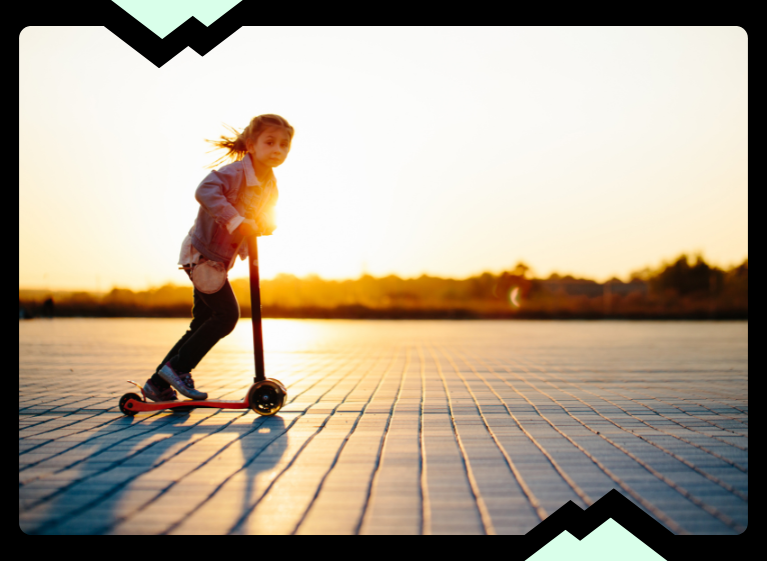3 important questions: A Guide To Choosing a Children's Scooter Based on Their Age
- Posted on
- By James @ 360 Cycles
- Posted in Children's Scooter
- 0

Choosing the right children's scooter can be a difficult task, but with the help of this guide, you'll be able to make an informed decision that will suit your child's needs. When choosing a scooter for your child, you'll want to take into account their age, weight and size. Additionally, consider the type of terrain they'll be using the scooter on (paved or unpaved).
Finally, be sure to ask your child about their preferences and see what type of scooter they would like to get. By answering these important questions, you'll be able to choose the perfect children's scooter for your family.
Based on these questions, you can choose the perfect children's scooter for them.
1. Where to buy a children's scooter in Ireland?
360 Cycles Clontarf, we are located in Clontarf North Dublin. We have a wide variety of children's scooters and electric scooters for different age groups. They also have staff who are experts in choosing the right scooter for a child. They also focus on accessories for scooters such as helmets, gloves, and backpacks. They also have staff who can help choose the right scooter for your child. 360 has long opening hours (8 pm Mon-Sat, 6 pm Sun & Bank Holidays) and precision mechanics. They are only closed 3 days a year (Dec 25th & 26th, Jan 1st).
2. What's the difference between a children's scooter and a children's mini scooter?
A children's scooter and a mini scooter can both be classified as pedal-powered vehicles, but there are a few important differences you should be aware of before purchasing one for your child. The main difference between a children's and a children's scooter mini micro is the size. A children's scooter typically measures about 24 inches wide by 12 inches long by 4 inches high, making it more substantial than a children's scooter mini micro which measures about 18 inches wide by 12 inches long by 2.5 inches high). In addition, a children's scooter typically has two wheels at the front and two at the back, while a mini children's scooter has only one wheel in the front and one in the back.
Another key difference between a children's and a mini scooter is the weight limit. A children's scooter can typically hold up to 220 pounds, while a mini scooter can only hold up to 150 pounds. This weight limit is important to keep in mind because it will determine how much effort your child can put into pedalling the vehicle. If your child is too young or too heavy for a children's scooter, then a mini scooter may be a better option for them.
3. Is there a certain children's scooter Ireland doesn't allow?
There is no certain children's scooter Ireland doesn't allow but a lot of toy children's scooters are not suitable for children under 3 years of age. This is because they contain small parts that your child could choke on. There are also many different types of children's scooters that can be used safely. However, some that are not allowed in Ireland include those with automatic engines and those that have a top speed greater than 30km/h. Electric bikes and e-scooters will be exempt from registration, tax or insurance if they are not able to travel at speeds above 25km/h, the Irish Government has confirmed. The long-awaited Road Traffic and Roads Bill will legislate for e-bikes and e-scooters, which have become more and more popular in recent years.
FAQ's
-
What is the best age to buy a children's scooter for your child?
There is no definitive answer to this question since different children will benefit from starting at different ages. Some parents may prefer their children start riding their scooters as early as 4 or 5 years old, while others may wait until their child is 8 or 9 years old. Ultimately, it is up to parents to decide when their child is ready to start using a scooter and make sure they are comfortable with the activity.
-
How do I correctly balance myself on a scooter?
There is no one right way to balance on a scooter, as different individuals may have different preferences. Some tips to help you achieve balanced footing on a scooter include placing the heels of your feet on the ground and using your toes to push off from the ground. Be sure to experiment with different techniques until you find one that works best for you.
-
What are the different types of scooters available?
There are a variety of different types of scooters available on the market, including electric, gas, and kick scooters. It is important to choose the right type of scooter for your child based on their age and ability level. Electric scooters are typically recommended for children younger than 8 years old, while older children can use gas or kick scooters. Be sure to read the manufacturer's instructions carefully before purchasing a scooter to ensure you know how to operate it safely.
-
What are the benefits of starting my child on a scooter?
There are many benefits to starting your child on a scooter, including improving balance and coordination, strengthening muscles and bones, and developing motor skills. Additionally, scooters can be a fun way for children to explore their environment and interact with others.
-
How do I store my scooter when not in use?
It is important to keep your scooter clean and free of debris to ensure it lasts longer. To store your scooter safely, place it on a level surface with the wheels facing down. Make sure the handlebars are positioned level and away from any walls or furniture, and secure the scooter with a strap or lock. If you have any issues with it just book an appointment here.










Comments
Be the first to comment...